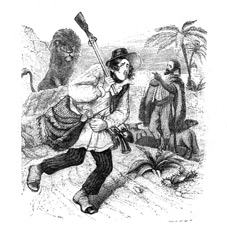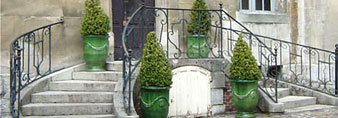THE SHEPHERD AND LION (VI, 1)
Fables are not what they at first appear,
The simplest animals are teachers here.
The naked moral soon the reader tires :
Fiction the happy precept best inspires.
Such tales should please and wisdom thus convey;
To tell for telling's sake is childish play.
Many great writers, therefore, of this kind,
At once improve and animate the mind
They seek no ornament, nor laboured length,
And all their words are chosen for their strength.
Phœdrus, so brief, was censured on that score,
But Æsop wrote with fewer words before.
And of a certain Greek (1), who would enhance
His merit through laconic elegance,
Four fines contain the tale ; but well or ill,
I leave to judges of superior skill.
Here let us see him with old Æsop meet,
Of a like subject both these writers treat.
A hunter one, a shepherd t'other brings,
I’ve kept to both in winding up of things ;
Adding some little touches now and then.:
Behold it nearly as from Æsop’pen :
A shepherd, missing lambkins from his fold,
Resolved to catch the thief so bold,
Went to a den, and spread his nets around,
Suspecting wolves would be the villains found.
He lingered near the spot, and prayed :
“ 0 king of gods ! come to my aid !
And let my nets, to my delight,
The rascal catch before my sight.
Of twenty calves all goodly in their kind,
I'll offer thee the fattest I can find ”
But straight a dreadful lion from the den
Came forth ; recoiling, half alive, he said,
“ How little man knows what to ask, or when !
To catch the. robber of my flock I prayed
Safe in the nets that I had laid.
0 king of gods ! a calf I offered then,
To bring the thief to light ;
I offer now an ox to take him from my sight ! ”
Thus Æsop wrote, chief author of this text :
Let’s try his imitator next.
(1) Gabrias |
THE LION AND HUNTER (VI, 2)
A certain braggadocio of the chace
Rad lost a hound of an uncommon race,
Suspected he had passed some lion's maw,
And asked a shepherd whom he saw :
“ Give me the thief's address, good friend,” he cried,
“ That I may glut my vengeance on his hide.”
“ Close by that mountain,” said the shepherd, “ keep ;
In paying him the tribute of a sheep
Per month, I wander where I please,
And thus I live in constant ease.”
Whilst they conversed the lion came that way
With agile feet ; the braggart in dismay
Fled and exclairned “ O Jove ! grant me some hole
That I may hide in while my bones are whole !”
True courage is to brave the danger near,
Nor it to seek, nor shun if it appear.
Many who brag their courage for the fight,
Give it their heels when it attacks their sight.
|
 |
| The Lion and Hunter (Grandville) |
|
PHŒBUS AND BOREAS (VI, 3)
The Sun and Boreas a traveller met,
Well clothed, and careless of the cold or wet.
’Twas early autumn, when the transient skies
Render to travellers precautions wise ;
When Iris shows her many-coloured bow,
That tells them they may shiver or may glow :
Uncertain months the Latins termed the season,
And cloaks were necessary for that reason.
Our man, expecting rain, was wise enough
To wear a mantle lined with solid stuff.
“ He's furnished,” Boreas said, “ for storms to-day,
Without foreseeing, by the way,
That if I had but half a mind,
No loop nor button he should find,
I'd give his mantle to the wind.
Phoebus, what do you say ? Methinks, in short,
This pastime might afford us real sport.”
“ Well,” Phoebus said, “ without more waste of words,
Let's wager on the fun this man affords‑
Which first shall give his shoulders to the weather,
If he brave you, or me, or both together.
Begin ; suffer you to hide my raye.”
“ Enough,” said Boreas, “ then withdraw your blaze,”
He said, and swelled his cheeks like a balloon ;
Blew blasts that seemed to threaten sun and moon,
Threw houses down, dashed ships upon the rock,
Whirled, whistled, roared, and all around him broke ;
And all to strip a traveller of his cloak !
The rider's care throughout the blustering din
Was still to keep his body buttoned in.
This saved him ; in this way he braved the blast,
The more wind blew, the firmer he held fast :
The storm but ruffled cape and folds at last.
Soon as the wager-hour expired,
Phoebus appeared, and Boreas retired.
The cheering rays upon the traveller broke,
And soon made him throw, sweating, off his cloak.
Nor did he scorch him to the last degree.
Mildness is better far than rage, we see. |
JUPITER AND THE FARMER (VI, 4)
Of yore Jove had a farm to rent ;
To advertise it, Mercury was sent.
Buyers appeared and offers made,
But not till they the matter weighed.
One urged the cost, and said the lands were rude,
Another gave his reasons just as good.
While they examine, bargain, and advise,
A bolder bidder, though not over-wise,
Offered so much, providing Jove would grant
Such weather as the farmer chose to want ;
Hot, cold, or stormy, mild, or wet, or dry,
In fine, to let his fancy rule the sky.
Jove yields. The contract signed, our man
Rains, blows, acts Jove as best he can.
In fact, he forms a climats all hie own,
Not even to his nearest neighbour known,
And felt no more
Than what they feel on fair Columbus’ shore.
His neighbours gain ; for plenty crowns the year,
And ripe and rich the fields and vines appear.
Receiver Mercury was badly paid.
Next year the whole was changed again ;
Our man some new arrangements made,
In choice of months, for sun or rain;
But yet his fields went wrong, he toiled in vain.
His neighbours' fields their usual crops possess.
What could he do but Jove again address,
And 'his imprudence to the god confess ?
Jove pardoned him, in his forgiving mood.
Let us from such examples then condude,
That Providence knows best what's for our good.
|
|



